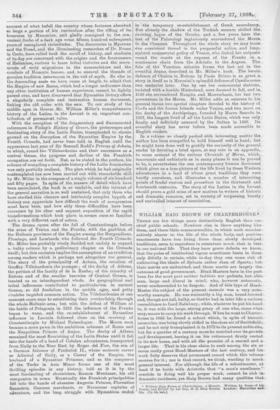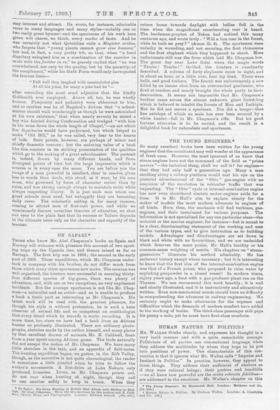WILLIAM HAIG BROWN OF CHARTERHOUSE.*
THERE are few things more distinctively English than our - chief public schools. Nowhere else is there anything like them, and these little commonwealths, in which each member actively shares in the life of the whole body, and positive - enactments have less living force than slowly developed traditions, seem to reproduce in miniature much that is beet . in our national life. That they have grave defects we know, that the pulse of intellectual vigoue sometimes beats in them only fitfully is certain, while to-day they run some risk of cultivating the ideals of Sybaris rather than of Sparta; but their merits are undoubted, and those merits are largely the outcome of good government. Head-Masters have in the past been for the most part neither faddists nor pedants, but able men, large and liberal in mind, who, however autocratic, never condescended to be despots. And of this type of Head- Master the subject of the present memoir was a very note- worthy example. He was eminently a big man, broad-browed and, though not tall, bulky, so that he had in later life a curious resemblance to Lord.Salisbury ; while, whatever he put his baud to, it was with the large, strong grasp of one who, come what may, means to carry his work through. When he went to Charter- house in 1863 he found a school which, in spite of historic memories, was being slowly stifled in the close air of Smithfield; and he not only transplanted it in 1872 to its present noble site, but for a quarter of a century more he watched over its growth . and development, leaving it on his retirement firmly rooted in its new home, and with all the promise of a second and a larger life. That is his clear claim to rank among the six or seven really great Head-Masters of the last century, and his. work fully deserves that permanent record which this volume secures for it ; nor is that record, we think, wanting in much: general interest. For although the life of a schoolmaster, at least if he holds with Aristotle that "a man's excellence" consists in doing well his proper work, cannot be rich in dramatic incidents, yet Haig Brown had many qualities that * 'Valiant Liaig Brown of Cliarterhouse : a Memoir. Written by Some of his Pupils, and Edited by hie Son, IL E. Haig Brown. London: Macmillan and. CO. 1.7c.1341. net.] may interest and attract. He wrote, for instance, admirable verse in many languages and many styles—notably one or two really great hymns—and the specimens of his work here given will charm, we think, every reader of taste. And he was certainly not what Quintilian calls a Magister aridus, who forgets that " young plants cannot grow sine humore," but had, in fact, a very pretty wit, so that, when "a local dignitary eulogised him as a combination of the suaviter in modo with the fortiter in re," he gravely replied that 'he was overwhelmed, not only by the quality, but by the quautity,-of the compliment," while his Sixth Form would only have quoted the famous lines- " Full well they laughed with counterfeited glee At all his jokes, for many a joke had he "—
after emending the most cruel adjective that the kindly Goldsmith ever employed. Above all, too, he was wholly human. Pomposity and pedantry were abhorrent to him, and so careless was he of Bagebot's dictum that "a school- master should walk wonderingly as though he were astonished at hie own existence," that when nearly seventy he seized a boy who fainted during Confirmation and trudged "with him in his arms down the whole length of Chapel,"—an act which few dignitaries would have performed, but which helped to make "Old Bill," as be was called, very dear to the hearts of lads. Such points, however, are perhaps of minor and chiefly domestic concern ; but the enduring value of a book like this consists in its striking presentation of the qualities which go to the making of a great schoolmaster. The portrait is, indeed, drawn by many different hands, and from divergent points of view, but the large impression which it creates is in every case the same. , You see before you the image of a man powerful in intellect, clear in resolve, given less to words than deeds, who stood, as it were, by his own mass, who governed by force of character rather than by rules, and was strong enough always to nutintain order while always respecting liberty. It is just such men whom our great schools most need, but unhappily they am becoming daily rarer. The scholastic calling is, for many reasons, ceasing to attract men of first-rate power, and while we wearisomely discuss countless theories of education, we shut our eyes to the plain fact that its success or 'failure depends in the ultimate issue only on the character and capacity of the teacher.







































 Previous page
Previous page